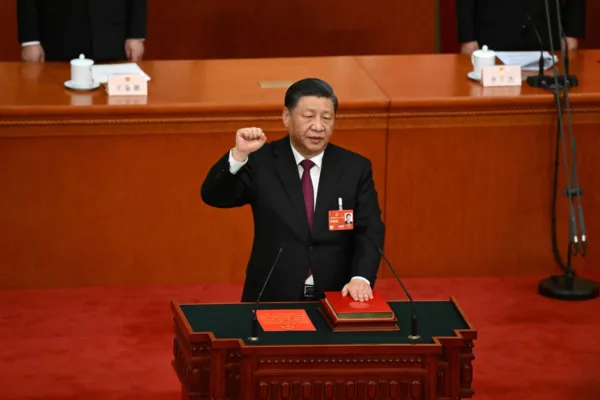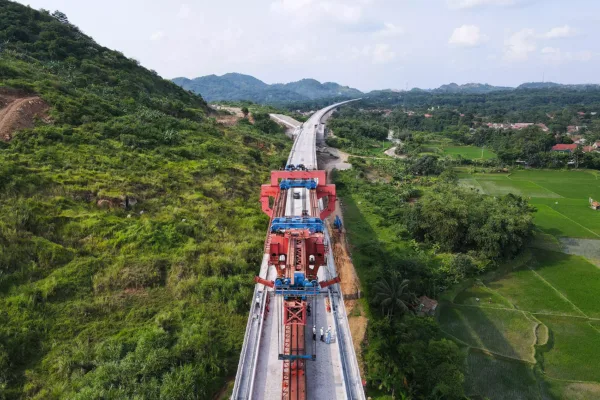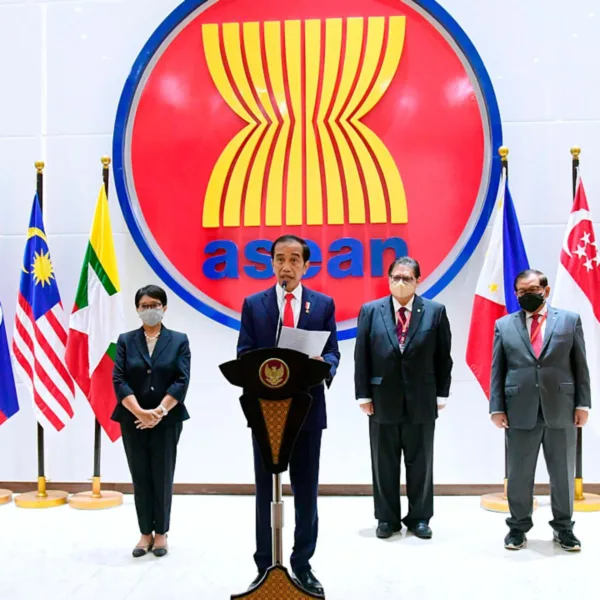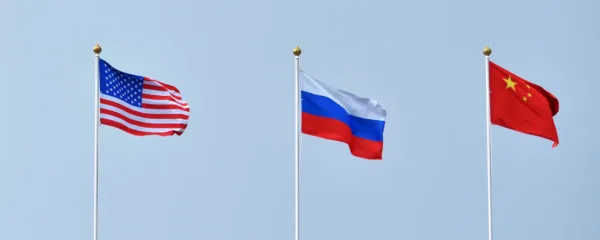Many argue that China’s rise as a superpower poses a formidable threat to the global community. By challenging the economies of developed democratic states, China attempts to undermine the post-World War II rules-based order designed to promote cooperation, liberalization, and democratization. Despite the existence of the Universal Declaration of Human Rights, the majority of the people in the world still lack effective protection, with access to these rights remaining highly unequal, particularly under totalitarian regimes. However, it would be unjust not to recognize the significant advancements achieved thanks to this rules-based system.
When this was first established, there was international consensus and there were international bodies to oversee ceasefires, provide aid for refugees, and even fight pandemics. This largely came as the result of liberal democracies pressuring authoritarian governments to comply with the universally established norms, often with the help from multilateral bodies such as the World Bank. One of the ways this was is by conditioning loans on meeting specific criteria, such as incentivizing higher environmental standards and protecting minority rights in recipient countries. More authoritarian governments saw themselves obliged to meet the requirements to ensure they have enough resources to stay in power.
However, since 2022, this order has faced blatant defiance by Russia’s invasion of Ukraine and by the subsequent use of its UN Security Council veto to shield itself from condemnation by the international community. While China presents a subtler way of defying the order, this does not mean that it is not equally as dangerous. With uncertain motives and future actions, China strategically seeks to reshape the global order from within. While Russia struggles with the external and internal repercussions of its imperialistic ambitions, including potential internal dissent, China’s approach prioritizes state interests over individual freedoms. China establishes precedent for more vague international norms by perpetuating a system where political bargaining supersedes the enforcement of clear rules. Thus, China manages to have more room to leverage its position as the second-largest economy in the world and convince those countries dependent on it to comply with its interests.
Keeping this in mind, the question remains disputed regarding China’s rise as a military and economic superpower and what it could mean for the international liberal order. Are the concerns raised by western liberal democracies regarding China’s ascent solely rooted in apprehension, or is there some nuance to it? In this article, I hope to explore some different perspectives on this topic, acknowledging that not all Chinese claims and assertions are baseless. Since at its core, China’s emergence as another big player presents a complex mix of opportunities and challenges for the international community requiring a deep understanding of its motives on its journey to becoming a superpower.
Under Xi Jinping’s leadership, China has positioned itself as an alternative to the resurgent cold-war mentality, exacerbated by Russia’s invasion in Ukraine. The world finds itself increasingly divided along ideological blocs, further resembling the polarization of the Cold War era. The prevailing global imbalance cannot be solely attributed to China’s disruptive actions, as evidenced by the alarming erosion of long standing arms control agreements like the Intermediate-Range Nuclear Forces Treaty (INF). This pivotal treaty, designed to curb nuclear proliferation and promote disarmament, collapsed due to Russia’s blatant non-compliance, prompting both Russia and the US to withdraw.

Secretary of Defense Mark T. Esper underscored Russia’s persistent violations, declaring, “Russia has failed to comply with its obligations under the INF Treaty,” compelling the US to withdraw effective August 2, 2019. NATO echoed this sentiment, affirming their full support for the US decision, citing Russia’s deployment of the 9M729 missile system, which flagrantly violated the treaty and posed substantial threats to Euro-Atlantic security. Considering this, China’s stance offers a compelling alternative, redirecting focus on development over ideological confrontation. While Russia is decisive about imposing its will through force, China advocates for addressing fundamental issues in developing countries that halt their economic growth such as infrastructure, food security, and employment. Simultaneously, China shuns the concerns of Western powers to ensure multi-party and democratic fair elections and presents itself as the one to prevent the imposition of western liberal values and strive for a more inclusive approach rooted in diversity and respect.
Since China embarked on its path of economic reform and opening up in 1978, its average GDP growth rate has been an astounding 9% per year. This unprecedented growth has lifted over 800 million people out of poverty. The scale of China’s economic expansion has created new opportunities for manufacturers worldwide with its status as the world’s largest goods importer. Its embrace of international institutions such as the World Bank and the Paris Agreement underscores its commitment to global cooperation and sustainable development. Through initiatives like the Belt and Road Initiative (BRI), China seeks to foster economic growth and stability beyond its borders, despite raising concerns about the expansion of its influence. Therefore, it is safe to say that China is then pursuing a multifaceted strategy, implementing both American and Russian principles of global governance to secure dominance. By becoming a major growth engine for Asia and the world, China is playing a crucial role in sustaining global economic growth, especially in times of uncertainty and recession.

However, Xi Jinping’s Belt and Road Initiative (BRI) raises questions about China’s intentions. Since BRI aims to establish a network of rail, road, and sea corridors across Eurasia, potentially extending as far as the Arctic if global warming allows it, it would facilitate partnerships with various friendly states through offering those nations benefits. This way the BRI allows China to expand its perimeters of influence without provoking direct resistance from neighboring countries. Therefore, while seemingly closely engaging with liberal values on one hand, China’s authoritarian government coupled with its control over information and innovation poses challenges to established world order. It is evident that Beijing diverges on norms of the current system such as human rights and seeks to create alternative institutions and models driven by the ambition to shape global dynamics in alignment with its interests. This can be seen through its foreign policy in areas where norms are still being established, such as internet governance, where China works with other authoritarian powers such as Russia.
While the United States grapples with internal and external challenges, China’s growing economic influence and engagement in international institutions offer new opportunities for collaboration and partnership. These opportunities look quite tempting to democracies, considering the previous foreign relations tactics that aimed to foster global cooperation in potentially “democratizing” authoritarian regimes. Paradoxically, however, such efforts provided a platform for China and other authoritarian regimes to fortify their dictatorial grip while deepening divides within liberal Western countries that are committed to uphold the existing liberal norms and institutions. This divide could either lead to a fractured world characterized by bipolarization, or, if embraced, pave the way for a multipolar world order where emerging powers like China contribute to shaping a more democratic, inclusive, and peaceful global order.
That is why the military and economic rise of China as a superpower may, in fact, be promising for international peace and stability. This may seem controversial at first glance, yet there are several arguments supporting this perspective. One need only look at the current state of the world to realize that international peace is nonexistent. The United States failed to be the guardian of international peace by repeatedly violating international law and facing no consequences, while policing and imposing its will on other nations. The erosion of trust in democratic institutions, polarization, corruption, and dysfunction, has undermined the credibility of the US as a champion of liberal values and democratic governance.

China, in contrast, has emerged as a global economic power, reshaping the geopolitical landscape. While some may perceive China’s rise as a threat to the existing world order, it is essential to recognize the potential benefits of China’s engagement in promoting economic development and cooperation on a global scale. This does not necessarily entail the enforcement of liberal values and human rights, but rather reinforcing cooperative values to prevent further polarization and conflict. Recognizing the limitations of attempting to impose universal moral standards, it becomes clear that a more pragmatic approach to global governance is essential for fostering sustainable peace and harmony.
To further explain this idea, consider the following: from the Cold War to present-day conflicts such as the Yugoslav War in the 1990s or Russia’s War in Ukraine, Europe has had to manage violence, whereas most of Asia has not witnessed a major war in the last two decades. Even though Asian countries do not have the same kind of relations existing in the EU, there have been no major wars during the same period which makes the achievement of peace even more prominent. Central to this success is Asia and China’s culture of pragmatism that treats political division as an impulse for closer dialogue manifesting the idea that “wars are the result of geopolitical incompetence, whereas peace reflects strategic skill” as pointed out by Kishore Mahbubani.
This pragmatism is important, since it marks a departure from the approaches of Cold War superpowers, the Soviet Union and the USA, offering a platform for constructive engagement despite China’s ambitions for influence. However it should be said that every country strives to impose its influence on others, as it is intrinsic to geopolitics and international governance. This pragmatic approach is demonstrated by the Association of Southeast Asian Nations, a regional organization that welcomed Vietnam at the end of the Cold War despite it being an adversary for many of its members. Meanwhile, Europe consistently excluded Russia – even Gorbachev’s proposal of a “common house of Europe” was rejected. This shows that ASEAN is fulfilling its purpose by being as inclusive as possible: since the launch of the ASEAN regional forum in 1994, one of its key aims was to bring together rivals like India and Pakistan, North and South Korea, or China and Japan. Today, East Asia is focused on the US-China geopolitical contest, which has immense potential to divide the region. However, thanks to The Regional Comprehensive Economic Partnership, an ASEAN initiative introduced in 2011, all ten ASEAN member states as well as Australia, China, Japan, New Zealand, and South Korea who are strong US allies, are now bound together by the world’s largest free-trade agreement to prevent major conflicts in the region.

The benefits of this inclusive approach speak for themselves. Between 2000 and 2022, ASEAN-China trade grew from $40 billion to almost $1 trillion. Remarkably, the $3 trillion ASEAN economy added more to global economic growth between 2000 and 2020 than the EU did with its $15 trillion economy according to the International Monetary Fund. This points to a lesson that Europe could learn from ASEAN. European regional integration has always been based on the principle that, “To join us, you must be like us.” But China in its foreign policy and ASEAN has inverted this principle, recognizing that, “Precisely because we are different, we must talk often and learn to work together.”
The discussed developments coupled by continuous interventions of both the US and Russia in the Middle East highlight a stark reality: the pursuit of a peaceful global order does not necessarily align with the interests of nations historically viewed as hegemonic. The foundation of the international order was initially rooted in voluntary association and enforced through sanctions and incentives, but has been attacked and challenged not only by its architect, the US, but also by other nations that indirectly subvert or sometimes even directly reflect the principles upon which the current world order was built. No matter China’s involvement, the world has fallen into jeopardy, and the promise of a cooperative global community now hangs by a thread.

Featured Photo by: Journal of Democracy




